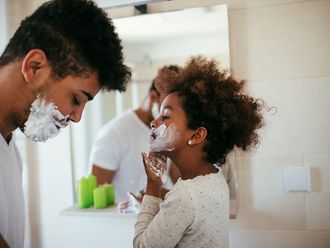
Dubai-based Anna, who requested her name be changed, began smoking in earnest when she was 14 years old. “It was a couple of days after my birthday, so I was excited, you know, going out,” she tells Gulf News in an interview. But the party she’d been invited to had people of all ages. “They kept offering me cigarettes until finally, I took one,” she recalls. “I thought it wasn’t that bad,” she says.
Anna, who was hiding this new habit from her parents, found herself looking for opportunities to smoke more. “I was sneaking behind my parents back – and I knew I was going to get caught, but I didn’t care about the consequences at that point, I had a lot of family issues that were going on, so I guess that was kind of my escape,” she says. She used older people who she knew to get her hands on the cigarettes and vapes.
“And I started doing it more and more until one day, my mum caught me with vapes. And that was the time I was scared because what if she found out that I’m smoking cigarettes? She was crying just by finding vapes. I lied my way out of it, but at the same time, I was paranoid. So, I gave it up for a week and that’s when I realised I was addicted. I wanted to smoke 24/7.
“My friends – a new circle - started noticing something was wrong; I was getting paranoid easily, I was chewing my nails, I was doing all those things. And that was the time I started getting acrylics on my nails, so it was obvious.”
Anna recalls the great sense of relief that came with explaining to her friends that her odd behaviour was because of withdrawal symptoms. And they in turn decided to be there for her, helping her get rid of her habit. “Eventually, I got rid of cigarettes, I thought about changing my life, spending more time with family, investing in my faith. And I told my friends – I think I’m addicted, and you guys are going to have to keep me away from it. And I have the kind of friends who really would because they cared about me. There are a few days where I go back to it but overall, it’s much better now,” says the 16 year old.
Peer pressure refers to the degree of influence your circle of friends wields on you. This isn’t always a bad thing though; peers can play cheerleaders and help you reach your goals.
Psychologist Laurence Steinberg of US-based Temple University conducted a study in 2015, which he told the Scientific American, a US-based magazine, “…suggests is that teenagers learn more quickly and more effectively when their peers are present than when they're on their own.”
And according to results of the ‘Family Survey Study’, conducted at the University of Michigan, peer pressure does more good than harm. The study, whose results were released in 2007, found that adolescents supported good choices rather than bad ones.
In the case of 16-year-old Pragya Gnanasekran, “A couple of months ago I was quite nervous about dancing in public. But since my friends were doing a dance module, I felt I had no other option, I had to push for dance as well. But obviously, it’s all worked out. It was good fun.”
Fourteen-year-old Ben, who requested his name be changed, told Gulf News that while there are many negative aspects of peer pressure and those are often focused on, there are some wonderful things about it too. He says: “I recently went to a waterpark and didn’t want to get into a ride because I’m quite claustrophobic. A friend of mine kept pushing, so I did it. And it was fantastic!”
Anna says: “I got myself exposed to a lot of wrong things just because of a wrong group of friends. Thankfully, things have changed. And my current group of friends helped with that.”
Worried about your kid’s group of friends?
Dr Diksha Laungani, Educational Psychologist at Dubai-based The Psychology Center, offers the following tips for parents:
Accept that it will happen: Succumbing to peer pressure and wanting to fit in is common. In fact, it is part of a developmental stage that adolescents need to go through as part of establishing their identities.
Stay on the fence: Avoid adopting a polarised view of peer relationships – research suggests that belonging to and being accepted by peer groups and having good relationships act as protective factors against anxiety and depression. Takeaway: All peer groups are not bad or a threat. Realise that positive relationships with family/parents and peers can co-exist.

All peer groups are not bad or a threat. Realise that positive relationships with family/parents and peers can co-exist.
Validate a positive sense of self: Positive self-worth and having a good sense of values act as long-term, preventative factors against more negative forms of peer influence. Try and reinforce your child’s strengths as much as possible, which involves praising their effort and hard work (not as much the end goal) and providing choices to problem-solve when needed instead of jumping in to help them. These strategies will help build their resilience which can be very useful in the face of peer pressure.
Practice: Work on scripts or role-play with your child to be more assertive in powerful social situations where they may feel out of control.
Don’t confuse behaviour with character: If you ever want to discuss your worries regarding your child’s peer group with them, ensure to name the behaviour/action that is concerning, rather than the people. This may help your child from adopting a defensive stance.








